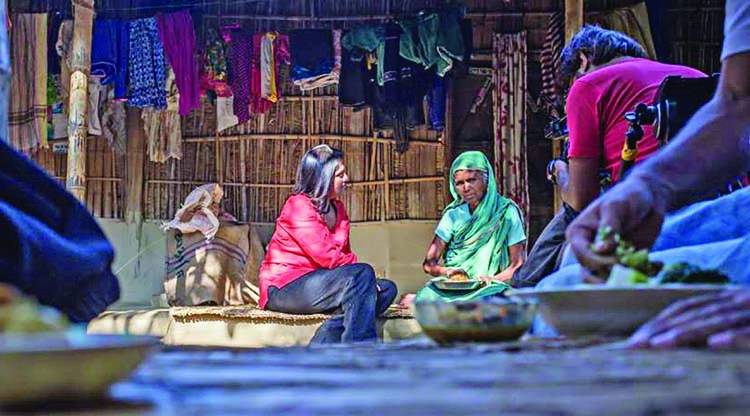17th Dhaka International Film Festival
Published: 01:56 AM, 17 January 2019
'Rising Silence' sheds light of Birangonas' lives

'Rising Silence', a feature documentary film sheds light on the lives of Birangona women by Leesa Gazi, produced by Komola Collective was premiered recently at the National Museum Main Auditorium on the 17th Dhaka International Film Festival.
'Rising Silence' is a journey of relationships between women dealing with war, violence, and daily prejudice to heal and create the future with unconditional love. In December 1971, during the Liberation War of Bangladesh, the Pakistani army adopted the rape and torture of Bangladeshi women as a military tactic across the country and in camps built throughout Bangladesh. Over the course of nine months of conflict, the Pakistani military and their local collaborators raped and made sex slaves of an estimated 200,000-400,000 Bangladeshi women and girls.
Faced with a huge population of hundreds of thousands of survivors of rape and torture, the new Bangladeshi government, only six days after the end of the war, publicly honored every woman and child subjected to rape in the War as Birangona (brave woman or war-heroine). However, after 1975, Birangona women were socially ostracized and attacked, seen only as symbols of shame and violence rather than as women and freedom fighters.
Leesa Gazi, a British Bangladeshi actor, playwright and founding member of a London-based arts company Komola Collective, has brought her film for the first time in Bangladesh at DIFF. Her father was a freedom fighter. She grew up hearing the stories of the War. When she turned 17, her father told her a story about Birangona women that never left her. In 2010, Leesa met with 21 Birangona women in Bangladesh.
She then started collecting their personal accounts to document their stories and from this, working with Komola Collective, a theatrical piece emerged. She later co-wrote the play 'Birangona: Women of War'. It's notable that she was the concept developer, co-writer, and performer of 'Birangona: Women of War' theatre production, nominated for 'The Offices' in 2014 and also toured Bangladesh in 2014.
Leesa then found herself drawn into close relationships with nine Birangona women. In 2015, these women brought Leesa into their homes and villages, beyond history and politics, to share in their lives and experiences as women. They showed her the vital importance of creating an intimate journey of wisdom gained from the fearless generosity of sharing.
They remain defiant as freedom fighters, citizens, daughters, sisters, wives, mothers, and grandmothers. By living, they overcome and grow beyond the monsters of war and daily prejudice that refuse to accept their human capacity to heal on their own terms.
"Their existence, in spite of being ignored and shut out for so long, is a testament to their resilience and their refusal to be diminished. They accepted me with no judgment and with an unconditional love that comes so naturally to them. They celebrate experiencing the wonder and beauty of friendship, nature, and music because they never gave up on life", said Leesa about the women in her first film.
The film is produced by Komola Collective, Openvizor & Making Her story with the kind support of Manusher Jonno Foundation & The Osiris Group, Director of Photography by Shahadat Hossain, Edited by Tijmen Veldhuizen, Music Direction by Sohini Alam & Oliver Weeks with Hasan Arif as the Research Advisor. Bangladesh screenings are supported by bKash and Brac.
The second screening of 'Rising Silence' will be held on Friday the 18 January at the Central Public Library at 7 pm on the 17th Dhaka International Film Festival. The ticket will be available before the show at the Public Library ticket booth and the festival ticket price is 50 Taka. Dhaka International Film Festival will donate all proceeds from the ticket sales to Freedom Fighter Birangonas and their families.




